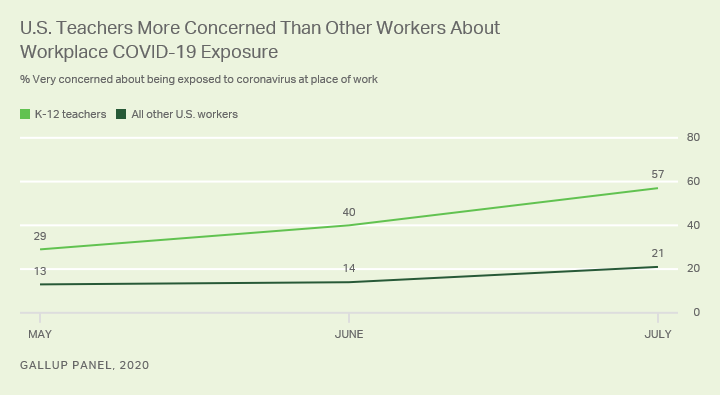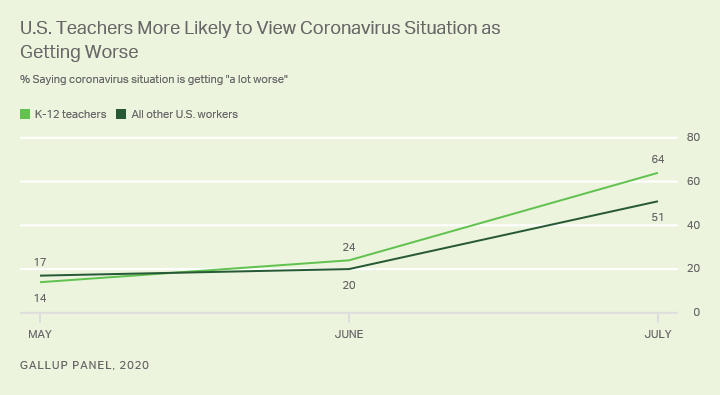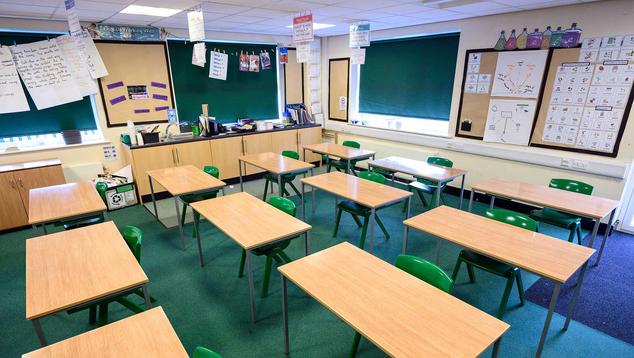Story Highlights
- 57% teachers, 21% other workers very concerned about COVID-19 exposure
- 64% teachers, 51% other workers say COVID-19 situation a lot worse
- Teachers have become as likely as other workers to prefer remote work
WASHINGTON, D.C. -- As school districts around the country begin to announce their plans for educating students this fall, a broad majority of U.S. schoolteachers say they are worried about being exposed to the coronavirus while working. Three-quarters of kindergarten through high school teachers say they are "very" (57%) or "moderately" (18%) concerned about COVID-19 exposure at their workplace. This compares with half of all other workers who are either very (21%) or moderately worried (29%).
| Very concerned | Moderately concerned | Not too concerned | Not concerned at all | |||||||||||||||||||||||||||||||||||||||||||||||||||||||||||||||||||||||||||||||||||||||||||||||||
|---|---|---|---|---|---|---|---|---|---|---|---|---|---|---|---|---|---|---|---|---|---|---|---|---|---|---|---|---|---|---|---|---|---|---|---|---|---|---|---|---|---|---|---|---|---|---|---|---|---|---|---|---|---|---|---|---|---|---|---|---|---|---|---|---|---|---|---|---|---|---|---|---|---|---|---|---|---|---|---|---|---|---|---|---|---|---|---|---|---|---|---|---|---|---|---|---|---|---|---|---|
| % | % | % | % | |||||||||||||||||||||||||||||||||||||||||||||||||||||||||||||||||||||||||||||||||||||||||||||||||
| Jun 29-Jul 19 | ||||||||||||||||||||||||||||||||||||||||||||||||||||||||||||||||||||||||||||||||||||||||||||||||||||
| K-12 teachers | 57 | 18 | 11 | 14 | ||||||||||||||||||||||||||||||||||||||||||||||||||||||||||||||||||||||||||||||||||||||||||||||||
| All other U.S. workers | 21 | 29 | 25 | 25 | ||||||||||||||||||||||||||||||||||||||||||||||||||||||||||||||||||||||||||||||||||||||||||||||||
| Jun 1-28 | ||||||||||||||||||||||||||||||||||||||||||||||||||||||||||||||||||||||||||||||||||||||||||||||||||||
| K-12 teachers | 40 | 27 | 24 | 10 | ||||||||||||||||||||||||||||||||||||||||||||||||||||||||||||||||||||||||||||||||||||||||||||||||
| All other U.S. workers | 14 | 33 | 28 | 25 | ||||||||||||||||||||||||||||||||||||||||||||||||||||||||||||||||||||||||||||||||||||||||||||||||
| May 11-31 | ||||||||||||||||||||||||||||||||||||||||||||||||||||||||||||||||||||||||||||||||||||||||||||||||||||
| K-12 teachers | 29 | 30 | 26 | 15 | ||||||||||||||||||||||||||||||||||||||||||||||||||||||||||||||||||||||||||||||||||||||||||||||||
| All other U.S. workers | 13 | 33 | 29 | 25 | ||||||||||||||||||||||||||||||||||||||||||||||||||||||||||||||||||||||||||||||||||||||||||||||||
| GALLUP PANEL, 2020 | ||||||||||||||||||||||||||||||||||||||||||||||||||||||||||||||||||||||||||||||||||||||||||||||||||||
These data are based on a subset of respondents from the ongoing probability-based online Gallup COVID-19 tracking survey who identified their occupation as a teacher of kindergarten through 12th-grade students. The June 29-July 19 polling included a sample of 495 teachers, while more than 650 teachers completed the survey in both May and June.
The latest data marks an uptick in teachers' levels of apprehension since May and June when fewer (though still majorities) were concerned.
Teachers are currently about three times as likely as other U.S. workers to say they are very concerned about workplace exposure to the virus. This divergence in the views of teachers and workers in all other industries has grown since May. While concern about workplace exposure has been fairly steady among workers who are not teachers, this unease has risen sharply among teachers.

Line graph. Percentages of K-12 teachers and all other U.S. workers who say they are very concerned about being exposed to COVID-19 at their place of work between May and mid-July. Teachers have consistently been more concerned about exposure. Currently, 57% of teachers are very concerned while 21% of all other workers are.
Teachers Have a Particularly Gloomy View of Coronavirus Situation
In recent weeks, Americans as a whole have become more likely to think that the U.S. coronavirus situation is worsening, and the latest data show that although teachers and all other workers have become much more likely to say the situation has gotten worse, teachers' view of its trajectory is particularly grim.
This latest difference in the views of teachers and workers who aren't teachers is notable because, until now, they viewed the situation similarly.

Line graph. Percentages of K-12 teachers and all other U.S. workers who think the coronavirus situation in the U.S. is getting worse between May and mid-July. In July, teachers have become significantly more likely than all other workers to say the situation is getting a lot worse. Currently, 64% of teachers say so while 51% of all other workers do.
K-12 Teachers Increasingly Prefer Remote Work
In June, as the 2019-2020 school year was ending with most teachers engaged in remote learning, 57% of teachers said, if given a choice, they would prefer to work remotely as much as possible in the future. A follow-up question probing workers' reasons for preferring remote work finds teachers' current preferences are disproportionately related to concern about the virus. In contrast, non-teachers' reason for preferring to work from home tilt more toward a personal inclination for remote working as opposed to COVID-related concerns.
In June, teachers' preference for remote work trailed the rate among workers in other professions. Since then, however, the gap between teachers and those who work in other fields has narrowed as 71% of teachers, and 76% of all others have become more desirous of remote work.
| Jun 1-28 | Jun 29-Jul 12 | ||||||||||||||||||||||||||||||||||||||||||||||||||||||||||||||||||||||||||||||||||||||||||||||||||
|---|---|---|---|---|---|---|---|---|---|---|---|---|---|---|---|---|---|---|---|---|---|---|---|---|---|---|---|---|---|---|---|---|---|---|---|---|---|---|---|---|---|---|---|---|---|---|---|---|---|---|---|---|---|---|---|---|---|---|---|---|---|---|---|---|---|---|---|---|---|---|---|---|---|---|---|---|---|---|---|---|---|---|---|---|---|---|---|---|---|---|---|---|---|---|---|---|---|---|---|
| % | % | ||||||||||||||||||||||||||||||||||||||||||||||||||||||||||||||||||||||||||||||||||||||||||||||||||
| U.S. K-12 teachers | 57 | 74 | |||||||||||||||||||||||||||||||||||||||||||||||||||||||||||||||||||||||||||||||||||||||||||||||||
| All other U.S. workers | 68 | 73 | |||||||||||||||||||||||||||||||||||||||||||||||||||||||||||||||||||||||||||||||||||||||||||||||||
| GALLUP PANEL, 2020 | |||||||||||||||||||||||||||||||||||||||||||||||||||||||||||||||||||||||||||||||||||||||||||||||||||
Of the many issues that may fuel workers' concerns about going back to work, feeling vulnerable to experiencing severe symptoms from COVID-19 is likely paramount for those with certain health conditions. The Gallup data show that teachers are no different from other workers in reporting they are at risk.
Overall, 38% of both teachers and all other workers alike say that they or someone in their household has a medical condition such as diabetes, heart disease, lung disease or something else that is considered high risk for serious complications from the coronavirus.
Bottom Line
Governors, school officials, teachers and parents are grappling with difficult decisions about the upcoming school year as the coronavirus pandemic continues to disrupt Americans' lives, and the number of cases is rising. The Trump administration continues to push for all U.S. children to return to in-person learning, and the American Academy of Pediatrics has also said in-person learning is preferable, although science should guide the decisions. A number of cities across the country have already announced that their school year will begin exclusively with virtual learning.
A broad majority of teachers express concern about possible exposure to COVID-19 at their workplace, and they are increasingly saying they prefer to work remotely almost entirely because of concerns about the virus. Even if districts decide to go fully in-person, whether they will be able to do so depends on teachers' willingness to go into work and parents' willingness to send their children to school.
Learn more about how the Gallup Panel works.




